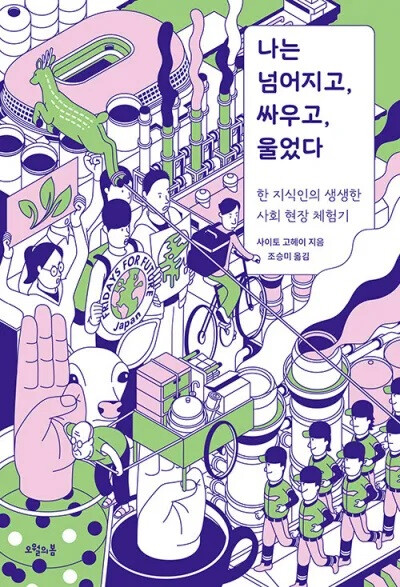
A new book by Japanese scholar Kohei Saito, titled "I Fell, Fought, and Cried" (published in Korean by Owallui Bom/May Books), delves into the profound lessons learned outside the confines of academia. This reportage essay compiles Saito's experiences across various "fields of life" in Japan, initially serialized in the Mainichi Shimbun.
Saito, an associate professor of philosophy at the University of Tokyo with a Ph.D. from Humboldt University in Berlin, is a prominent Marxist thinker known for his work on ecology and political economy. His other notable books include "Capital in the Anthropocene" (published in English as "Slow Down: The Degrowth Manifesto"), which has sold over half a million copies, and "Karl Marx's Ecosocialism."
In "I Fell, Fought, and Cried," Saito transcends mere occupational tourism. He recounts experiences ranging from delivering for Uber Eats to undergoing a "full male makeup" session at a department store and accompanying deer hunters. Through these direct encounters, he meticulously examines the intricate connections between structural societal issues and individual lives. For instance, his engagement with Nintendo Switch's "Animal Crossing: New Horizons" prompts him to recall Robert Owen's utopian community, "New Harmony," a 19th-century socialist experiment in Indiana, USA, that aimed for social equality and communal living but ultimately dissolved. Similarly, observing cultured meat production leads him to ponder the ethical concerns of corporate monopoly over such technologies.
A key strength of Saito's work lies in its humility. He acknowledges the limitations of his outsider perspective, avoiding the pretense of full understanding from brief experiences. He admits the potential for misinterpretation and unintentional harm but strives to share the critical awareness gained from his observations. As Saito asserts, "Meeting others without being confined within myself is a way to cure 'imagination deficiency.' That's why we must go to the field." This ethos transforms his explorations, whether tasting cricket pasta or contemplating the mainstreaming of insect-based diets, into a compelling narrative that invites readers to experience and reflect alongside him. His vivid, experiential journey offers a unique and engaging "reading pleasure," leaving readers feeling as if they too have "fallen, fought, and cried" with the scholar.
[Copyright (c) Global Economic Times. All Rights Reserved.]






























